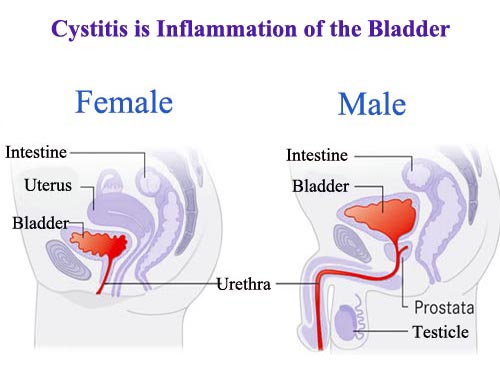Acute Cystitis (Bladder Infection)

Published: 18 Jun 2025
ICD9: 595.0 ICD10: N30.01 ICD11: GC00.1
Acute cystitis, commonly known as a bladder infection, is an inflammation of the bladder, usually caused by a bacterial infection.
It's a type of urinary tract infection (UTI) that primarily affects women, although men can also get it.
Here's a breakdown:
![]() What it is: An infection and inflammation of the bladder lining.
What it is: An infection and inflammation of the bladder lining.
![]() Cause: Usually bacteria (most commonly E. coli) entering the urethra and traveling up to the bladder.
Cause: Usually bacteria (most commonly E. coli) entering the urethra and traveling up to the bladder.
![]() Symptoms: These can vary, but common symptoms include:
Symptoms: These can vary, but common symptoms include:![]()

![]() Frequent urination: Feeling the need to urinate often.
Frequent urination: Feeling the need to urinate often.![]()

![]() Urgency: A strong, sudden urge to urinate.
Urgency: A strong, sudden urge to urinate.![]()

![]() Pain or burning sensation during urination (dysuria).
Pain or burning sensation during urination (dysuria).![]()

![]() Cloudy or strong-smelling urine.
Cloudy or strong-smelling urine.![]()

![]() Blood in the urine (hematuria).
Blood in the urine (hematuria).![]()

![]() Lower abdominal discomfort or pressure.
Lower abdominal discomfort or pressure.![]()

![]() Feeling of incomplete bladder emptying.
Feeling of incomplete bladder emptying.
![]() Diagnosis: Doctors typically diagnose cystitis based on symptoms and a urine test (urinalysis) to detect bacteria and white blood cells. A urine culture may be done to identify the specific type of bacteria.
Diagnosis: Doctors typically diagnose cystitis based on symptoms and a urine test (urinalysis) to detect bacteria and white blood cells. A urine culture may be done to identify the specific type of bacteria.
![]() Treatment: The standard treatment is antibiotics prescribed by a doctor. Pain relievers can also help manage discomfort. Drinking plenty of water is also important.
Treatment: The standard treatment is antibiotics prescribed by a doctor. Pain relievers can also help manage discomfort. Drinking plenty of water is also important.
![]() Complications: If left untreated, the infection can spread to the kidneys, leading to a more serious kidney infection (pyelonephritis).
Complications: If left untreated, the infection can spread to the kidneys, leading to a more serious kidney infection (pyelonephritis).
Risk Factors:
![]() Female anatomy: Women have a shorter urethra, making it easier for bacteria to reach the bladder.
Female anatomy: Women have a shorter urethra, making it easier for bacteria to reach the bladder.
![]() Sexual activity: Bacteria can be introduced into the urethra during intercourse.
Sexual activity: Bacteria can be introduced into the urethra during intercourse.
![]() Certain types of birth control: Diaphragms and spermicides can increase the risk.
Certain types of birth control: Diaphragms and spermicides can increase the risk.
![]() Menopause: Lower estrogen levels can lead to changes in the urinary tract that make it more susceptible to infection.
Menopause: Lower estrogen levels can lead to changes in the urinary tract that make it more susceptible to infection.
![]() Catheter use: Urinary catheters can introduce bacteria into the bladder.
Catheter use: Urinary catheters can introduce bacteria into the bladder.
![]() Underlying medical conditions: Diabetes and conditions that weaken the immune system can increase risk.
Underlying medical conditions: Diabetes and conditions that weaken the immune system can increase risk.
![]() Enlarged prostate (in men): Can cause incomplete bladder emptying, leading to infection.
Enlarged prostate (in men): Can cause incomplete bladder emptying, leading to infection.
![]() Urinary retention: Any condition that prevents the bladder from fully emptying can increase risk.
Urinary retention: Any condition that prevents the bladder from fully emptying can increase risk.
Important Considerations:
![]() See a doctor: If you suspect you have cystitis, it's essential to see a doctor for diagnosis and treatment. Self-treating can lead to complications and antibiotic resistance.
See a doctor: If you suspect you have cystitis, it's essential to see a doctor for diagnosis and treatment. Self-treating can lead to complications and antibiotic resistance.
![]() Prevention: There are measures you can take to reduce your risk, such as:
Prevention: There are measures you can take to reduce your risk, such as:![]()

![]() Drinking plenty of water.
Drinking plenty of water.![]()

![]() Wiping front to back after using the toilet.
Wiping front to back after using the toilet.![]()

![]() Urinating after intercourse.
Urinating after intercourse.![]()

![]() Avoiding irritating feminine products.
Avoiding irritating feminine products.![]()

![]() Considering cranberry products (though evidence of their effectiveness is mixed).
Considering cranberry products (though evidence of their effectiveness is mixed).
![]() Recurrent UTIs: If you experience frequent UTIs, your doctor may recommend further testing or preventative measures.
Recurrent UTIs: If you experience frequent UTIs, your doctor may recommend further testing or preventative measures.
In summary, acute cystitis is a common bladder infection characterized by inflammation and infection, typically caused by bacteria. Prompt diagnosis and treatment with antibiotics are crucial to prevent complications.